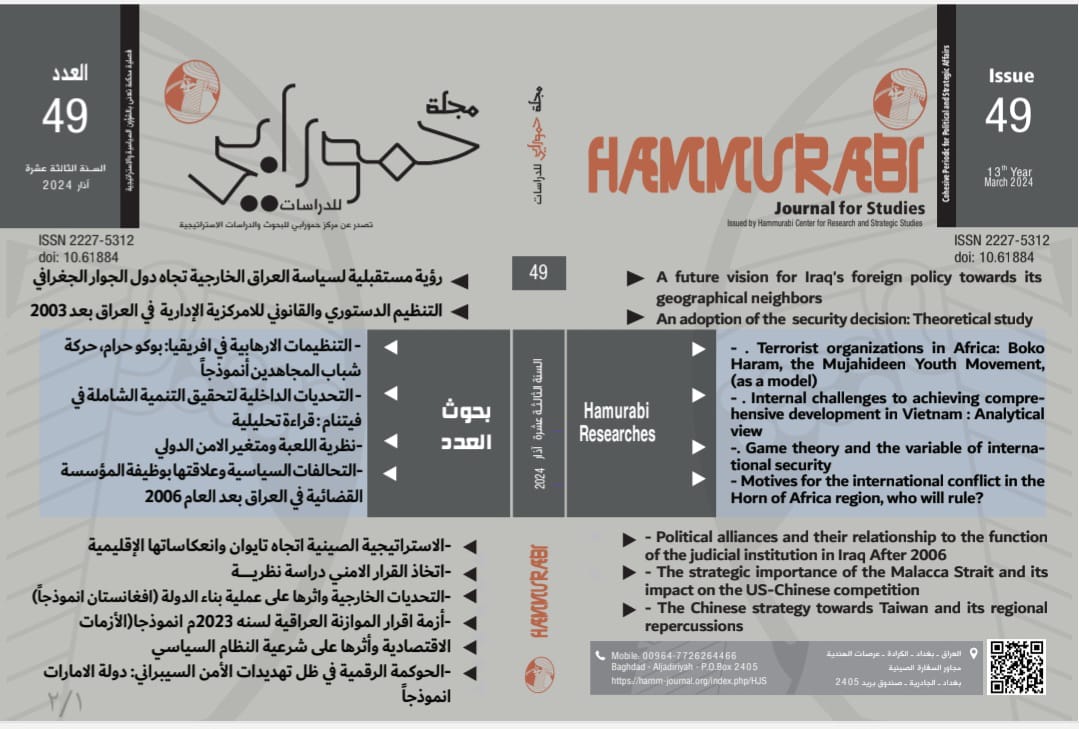The constitutional and legal organization of administrative decentralization in Iraq after 2003
DOI:
https://doi.org/10.61884/hjs.v13i49.439Abstract
Abstract
Administrative centralization is considered successful in small countries that are characterized by unity of their geography and the nature of their population, which is of one ethnicity, as this system is able to address the needs of all types of the country. This system is also successful in a country whose population is characterized by political immaturity and cannot establish an autonomous region for governance. Local citizens in this system implement the general state policy and avoid waste.
It is noted that the centrally unified government is strong at the level of foreign relations, and in times of war, political interests are concentrated in the center, and the influence of the national spirit is the same, not weakened by sub-identities or local units. Centralism is characterized by flexibility, as the committee that draws up the constitution does not interfere with the regional divisions of the country or in the distribution of powers of government between the center and the administrative units because these matters are related to the internal organization and are decided by the government itself. The strength of the government lies in the absence of a state of conflict over authority, confusion in responsibility, duplication of work, or the occurrence of a state of overlap between competencies and powers.
One of the most prominent disadvantages of this system is its loss of local self-rule. The problem here lies in the fact that the central government is far from the needs of the people, and this leads to a clear deficiency in local interests, as all decisions are placed on government employees in the center who are burdened with work. This also leads to a fact that all decisions taken are without evaluation of local conditions, and those in charge of implementing the center’s decisions have no understanding of the desires of the region. Thus, it is noted that the central system does not pay attention to the people and their public interests, strengthening the central bureaucracy. This indicates that this system cannot be applied on mature people, who politically believe in freedom and democracy. As for the decentralized system, it is noticed that Iraq after the change followed decentralization in administration because it suffered from the bad consequences before the change to the system of administrative subordination. There are successful experiences that Iraq emulated, such as the American experience and other countries that achieved a qualitative leap in the level of management of their public facilities. Here, it must be noted that the disengagement and similarity between them is not to be confused, as many countries in the southern world operate according to a system of administrative centralization, such as the Syrian and Egyptian regimes, and the Kingdom of Saudi Arabia and Iraq previously, as the capital holds and controls all joints of the state, and this is what puts the people in a state of disapproval of these political systems. As for the decentralized administrative system, it is noted that most of the countries in the global North operate with it and it has proven successful in delivering the services and needs of the local population to the center. Most countries in the global south are now changing their old systems. An example of this is Iraq, where the system of administrative decentralization was implemented after 2003 to get rid of the intense concentration in administration, curb public freedoms, neglect local facilities, and prevent people from participating in administration and governance, and this is what created a state of tension among the local population towards the center.
Keywords: Centralization, Decentralization, Negatives and Positives












